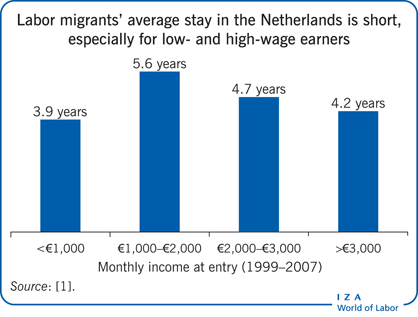Elevator pitch
The majority of immigrants stay only temporarily in the host country. When many migrations are temporary, it is important to know who leaves and who stays, and why. The key questions for the host country are whether immigrants are net contributors to the welfare system and whether migrants assimilate quickly. The key questions for the home country are whether migrants return and who returns. The host country gains when unsuccessful migrants leave, while the home country may gain when successful migrants leave. Empirical evidence reveals that both low-income-earning and high-income-earning migrants leave the host country quite soon.
Key findings
Pros
Many migrants stay only temporarily. Theoretically, the effect of higher wages on the duration of migration is ambiguous, making it an empirical question.
Low-income migrants leave sooner when they fail to find adequate work.
Outmigration of low-income migrants reduces the fiscal burden on the host economy.
Return of high-income migrants reduces brain drain in the home country.
Income is a key factor affecting return migration, in particular for labor migrants.
Cons
Labor market status affects both wages and migration duration.
High-income immigrants leave faster when they are target savers, but not as fast as low-income migrants.
Outmigration of high-income migrants is a fiscal loss to the host economy.
It is unclear whether migrants who leave return home or move to another host country.
Income may not be the main determinant of return migration, especially for non-labor migrants.
